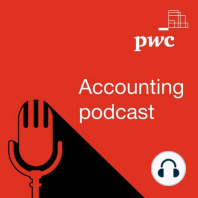47 min listen

Facts on SPACs: Accounting differences between private and public
Facts on SPACs: Accounting differences between private and public
ratings:
Length:
35 minutes
Released:
Sep 2, 2021
Format:
Podcast episode
Description
Special-purpose acquisition companies (SPACs) have been around for some time, but in the last 24 months there have been an unprecedented number of companies going public via a SPAC transaction. In our Facts on SPACs mini-series, we cut through the noise to help you focus on some of the key issues relating to these transactions. In episode five of our six-part series on SPACs, Heather is joined by Jay Seliber, PwC National Office partner, and John Horan, PwC National Office managing director, to talk through key accounting and reporting differences between private and public company financial statements and to share related insights and reminders.Topics include:1:11 - Mezzanine equity. Found somewhere between liabilities and shareholders’ equity, John explains what mezzanine equity is and the SEC’s rules for presenting it. 9:58 - Earnings per share. A complicated area, made even more so by the complex capital structures commonly seen in the operating companies involved in a SPAC—Jay and John highlight some key areas of focus when computing earnings per share for the first time. 18:43 - GAAP alternatives for private companies. Sometimes referred to as Private Company Council accounting alternatives, John breaks down three accounting alternatives that can be elected by private companies but would need to be unwound before your first SEC filing. 23:12 - New accounting standards and additional disclosures for public companies. For public companies, there are a number of incremental required disclosures across many topics as compared to private companies. Additionally, most ASU adoption dates come quicker when compared to private companies—Jay and John explain.30:45 - Wrap-up. Going from a private to public company can be a lot of work. Jay and John close with which areas they think may need the most attention. Want to learn more? Explore our Financial statement presentation guide for specific topics and listen to some of our past podcasts mentioned by Jay and John: Facts on SPACs: A focus on warrants, earnouts, and EPSFull disclosure: Earnings per share (EPS)Stock-based compensation issues in an IPO and SPAC, explained.Jay Seliber is a partner in PwC’s National Office. He leverages over 30 years of experience to help clients with their most complex accounting matters, particularly in the areas of mergers and acquisitions, revenue recognition, stock compensation, earnings per share, employee benefits, restructurings, impairments, and financing transactions. Jay is presently PwC's representative to the FASB's Emerging Issues Task Force.John Horan is a managing director in PwC’s National Office with almost 15 years of experience assisting clients with complex accounting issues. With particular expertise in foreign currencies, liabilities and equity, earnings per share, and derivatives and hedging, John uses his expertise to help companies with large capital transactions and IPOs. Transcripts available upon request for individuals who may need a disability-related accommodation. Please send requests to us_podcast@pwc.com.
Released:
Sep 2, 2021
Format:
Podcast episode
Titles in the series (100)
Forecast 2021: PwC’s Global Chairman on strategy and our CEO survey by PwC's accounting podcast